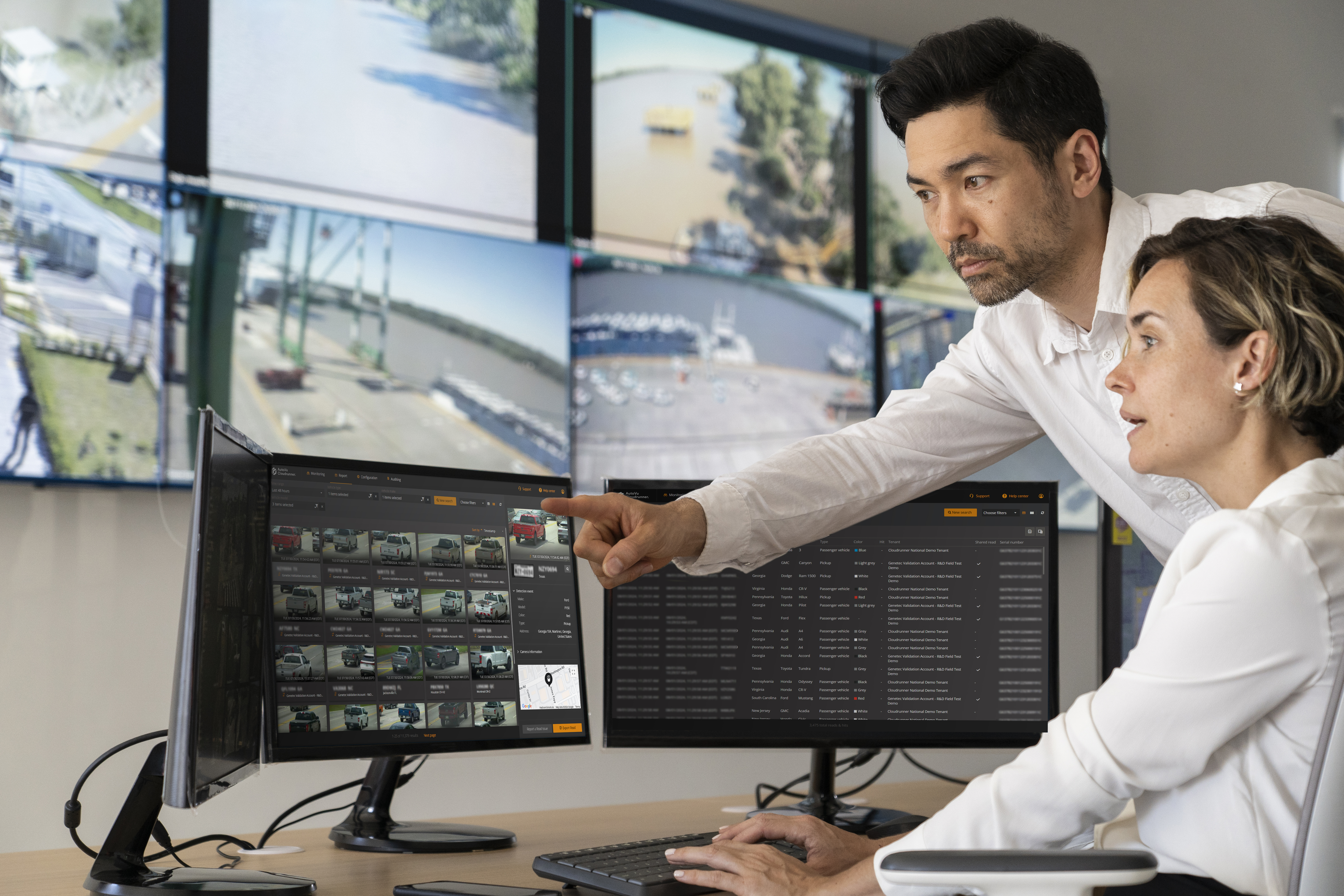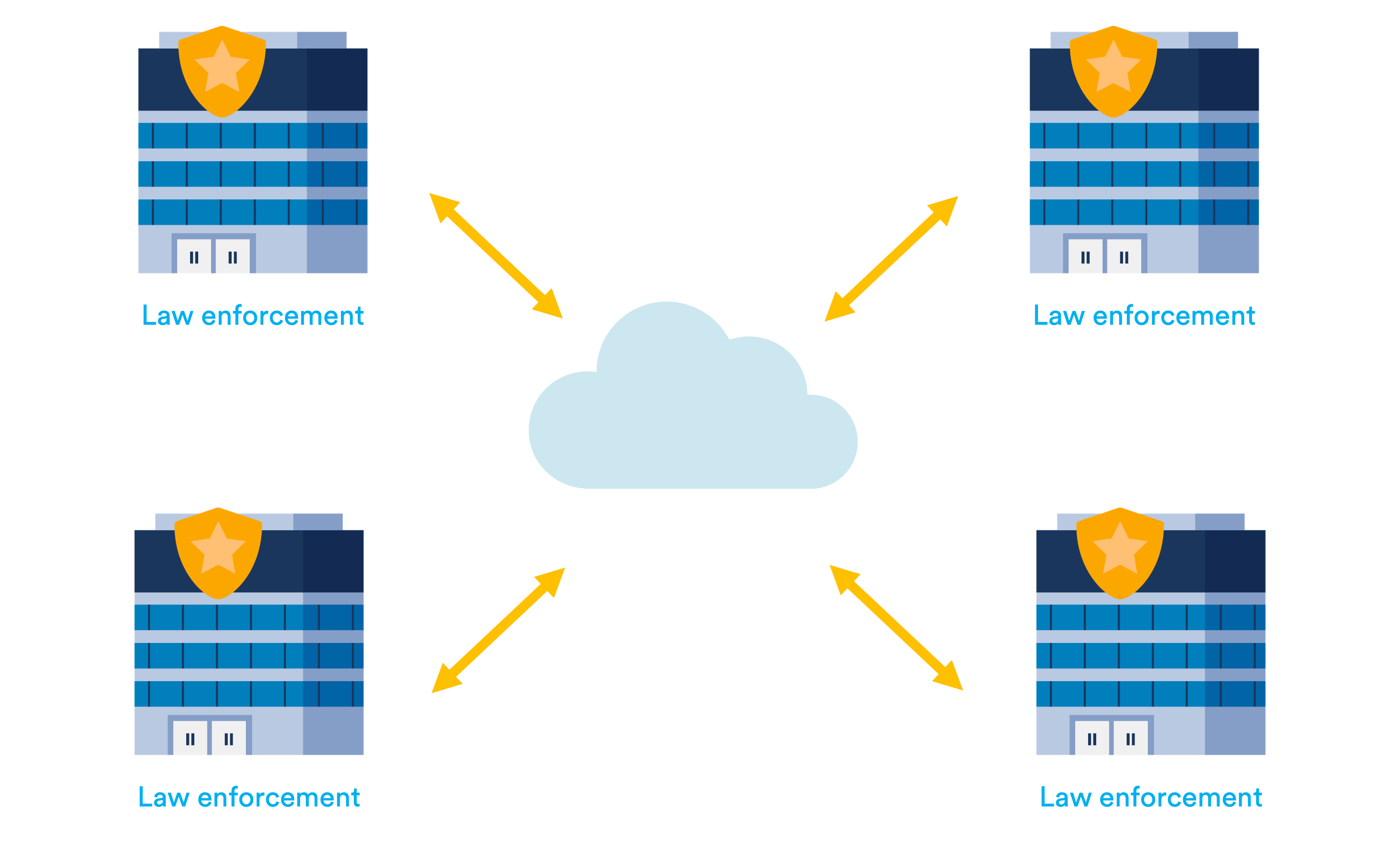
Collaborative intelligence for Genetec Cloudrunner
This latest feature simplifies collaboration across communities and can help enhance public safety. Learn how to share automatic license plate recognition (ALPR) data between partnered entities.

Crime knows no boundaries, and now, neither does Genetec Cloudrunner™. Collaborative intelligence allows you to share ALPR data across communities, whether it’s law enforcement agencies or private enterprises. Having a unified approach without boundaries means you can respond to incidents and solve crimes, faster.
What is collaborative intelligence?
Collaborative intelligence is the strategic sharing of read data from ALPR cameras with other organizations. This can range from local police departments to private entities and community groups like neighborhood HOAs. Securely share information for a more fluid and cooperative approach to safety.
It also helps enhance situational awareness and create a more unified response to security challenges, by connecting organizations to be within a single network. This way, no matter where a crime occurs, it can be addressed collectively and efficiently.
A solution with privacy in mind
Collaborative intelligence is designed with data privacy in mind. That means you have complete authority over who can share and access your ALPR data within Genetec Cloudrunner.
How data can be shared using Cloudrunner
ALPR data sharing can happen in three ways:
- Law enforcement to law enforcement
- Private entity to law enforcement
- Private entity to private entity
 1. Sharing data between law enforcement agencies
1. Sharing data between law enforcement agencies
By facilitating ALPR data sharing among law enforcement agencies, communities can significantly enhance their ability to apprehend suspects who attempt to escape across jurisdictional boundaries.
Example: Expanding your search for a fleeing felon
If a law enforcement agency is searching for a vehicle linked to a recent felony on a local hotlist, they can view the shared ALPR reads from neighboring jurisdictions using collaborative intelligence. Suspecting that the felon has fled the city, the agency can view shared ALPR reads from their neighboring cities. Once they receive an alert from another city's Cloudrunner camera, they can easily pinpoint the vehicle’s location. Using this information, law enforcement can coordinate and quickly take action to apprehend the suspect before they can travel further.
 2. One-way sharing to local authorities (private entity to law enforcement)
2. One-way sharing to local authorities (private entity to law enforcement)
By enabling one-way ALPR data sharing from private entities to law enforcement agencies, communities such as schools and residential areas can proactively safeguard their environments. This improves cooperation with local authorities, enhancing the ability to pre-emptively address potential security threats.
Example: Preventing vehicle theft groups
Vehicle theft is a common concern for many communities. In a typical scenario, criminals steal a car with the intention to commit another crime in a different location. Using collaborative intelligence, the moment a partner’s Cloudrunner camera reads the stolen vehicle, its license plate is recognized against a hotlist. Local authorities can be immediately informed and can swiftly respond at the location.
 3. Data sharing among private entities
3. Data sharing among private entities
Retail organizations with multiple locations, residential community managers, and parking companies increasingly use ALPR technology to synchronize their security efforts. Using collaborative intelligence and sharing ALPR data within their private network, they can significantly improve their preventive measures and reaction capabilities against common urban nuisances and criminal activities.
Example: Tackling organized retail theft of construction supplies
Organized retail crime groups often target stores in specific areas. A network of different retailers in a community can install Cloudrunner cameras across their locations to capture data more collectively. This means each location will be able to track vehicle license plates that enter their premises, and access shared ALPR data with other participating retailers nearby.
Through collaborative intelligence, when a suspect vehicle that is linked to previous thefts is detected at a location, a real-time notification is sent to the store that had it flagged. This store can then conduct a post-investigation to understand where the vehicle has been from partner reads. By informing their partners about the suspect, the retailers can collaboratively prevent further thefts, build stronger cases against offenders, and ensure better protection of their assets.
Collaborative intelligence capabilities
As a law enforcement agency, you can:
- Enhance situational awareness and create a unified response to security challenges
- Expand your network by connecting with private partners and requesting data sharing
- Request access to private ALPR cameras for quicker case resolutions
- Run hotlists against data from partners and receive alerts on matches
As a private entity, you can:
- Choose to accept or deny data sharing requests from local law enforcement, contributing to better community safety
- Establish partnerships with other private entities to enhance security efforts
- Expand your security network and improve overall protection
Requirements
-
Collaborative intelligence is available to all Cloudrunner subscribers
-
Cloudrunner is only available in North America